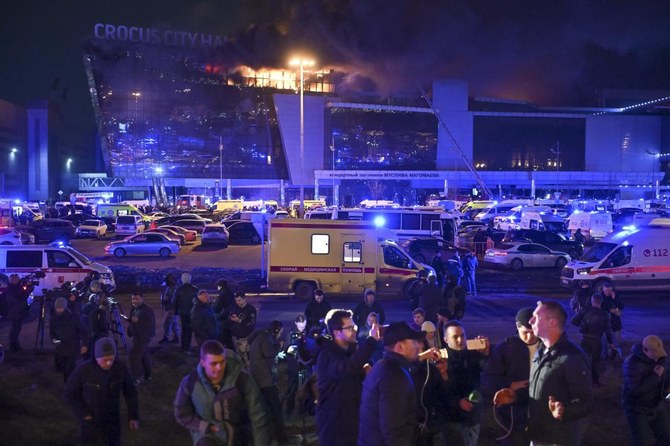MOSCOW: Russia on Tuesday sought to shift blame for the Moscow concert hall attack onto Ukraine and its Western backers, despite the Daesh group claiming responsibility for the massacre of at least 139 people.
The Kremlin’s security services have been scrambling to explain how gunmen on Friday managed to carry out the worst attack in Russia in over two decades.
President Vladimir Putin has acknowledged that “radical Islamists” conducted the bloody assault, but suggested they were linked to Ukraine, two years into the Kremlin’s offensive on the country.
The head of Russia’s FSB security agency Alexander Bortnikov said Tuesday that while those who had “ordered” the attack had not been identified, the assailants were heading to Ukraine and would have been “greeted as heroes.”
“We believe the action was prepared both by the radical Islamists themselves and, of course, facilitated by Western special services, and Ukraine’s special services themselves have a direct connection to this,” Bortnikov was cited as saying by Russian news agencies.
Ukraine has fiercely rejected any accusations from Moscow that it was tied to the assault, with a top aide to President Volodymyr Zelensky saying the Kremlin was looking to cover up the “incompetence” of its intelligence agencies.
The Kremlin has expressed confidence in the country’s powerful security agencies, despite questions swirling over how they failed to thwart the massacre after public and private warnings from the United States.
Daesh militants have said several times since Friday that they were responsible, and Daesh-affiliated media channels have published graphic videos of the gunmen inside the venue.
French President Emmanuel Macron on Monday said Paris had information that the militants were responsible and warned Russia against exploiting the attack to blame Ukraine.
The concert hall massacre was a major blow for Putin just over a week after he claimed a new term after one-sided elections the Kremlin billed as an endorsement of his military operation against Ukraine.
Putin on Monday said for the first time that “radical Islamists” were behind last week’s attack, but sought to tie it to Kyiv.
Without providing any evidence, Putin connected the attack at Crocus City Hall to a series of incursions into Russian territory by pro-Ukrainian sabotage groups, and said they were all part of efforts to “sow panic in our society.”
A court in Moscow meanwhile on Tuesday remanded an eighth suspect in custody over the attack at the Moscow concert hall.
Moscow earlier announced it had detained 11 people in connection with the attack, which saw camouflaged gunmen storm into Crocus City Hall, open fire on concert-goers and set the building ablaze.
The court’s press service said the latest suspect to be remanded was a man originally from the Central Asian country of Kyrgyzstan.
Officials said he was ordered to be held in detention until at least May 22, without detailing the exact accusations against him.
Four men charged on Sunday with carrying out the attack are citizens of Tajikistan, also in mainly Muslim Central Asia.
Three more suspects — reportedly from the same family and including at least one Russian citizen — were charged on terror-related offenses on Monday.
A Turkish official said two of the Tajik suspects had traveled “freely between Russia and Turkiye” ahead of the attack.
The two had both spent time in Turkiye shortly before the attack and entered Russia together on the same flight from Istanbul, the official said.
All of those held in custody have been charged with terrorism and face up to life in prison.
The Kremlin has so far pushed back at suggestions the death penalty will be re-introduced after the attack.
Russia blames Kyiv, West over Moscow gun attack
https://arab.news/vsue8
Russia blames Kyiv, West over Moscow gun attack

- The head of Russia’s FSB security agency Alexander Bortnikov said Tuesday that while those who had “ordered” the attack had not been identified, the assailants were heading to Ukraine
- “Ukraine’s special services themselves have a direct connection to this,” Bortnikov was cited as saying
Recovery of New Zealand landslide victims halted on safety concerns

- Six people, including two teenagers, are presumed dead after heavy rains triggered Thursday’s landslide at Mount Maunganui
- Authorities have been working to identify the victims after human remains were found at the site on Saturday
SYDNEY: New Zealand authorities suspended recovery efforts on Sunday for victims of a landslide that hit a busy campground on the country’s North Island.
Six people, including two teenagers, are presumed dead after heavy rains triggered Thursday’s landslide at Mount Maunganui on the island’s east coast, bringing down soil and rubble at the site in the city of Tauranga, crowded with families on summer holidays.
Authorities have been working to identify the victims after human remains were found at the site on Saturday.
But a crack found at the site prompted recovery work to cease for the day on Sunday, said police Superintendent Tim Anderson.
“As a result of that, we’ve had to pull all our staff out,” Anderson told reporters at Mount Maunganui, adding, “We’ve had to do that for the safety of everyone concerned.”
He did not specify when work would resume, saying the authorities were taking it “day by day at the moment.”
Prime Minister Christopher Luxon said on Saturday it was “devastating to receive the news we have all been dreading,” after the rescue operation shifted to recovery.
“To the families who have lost loved ones — every New Zealander is grieving with you,” Luxon posted on X.
The heavy rain this week unleashed another landslide in the neighboring suburb of Papamoa, killing two.














